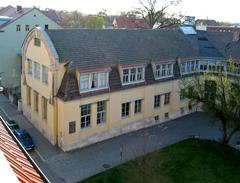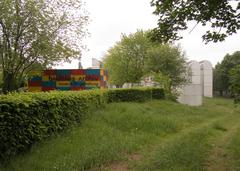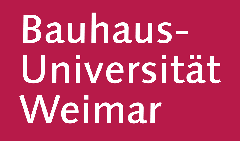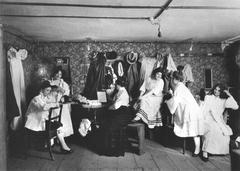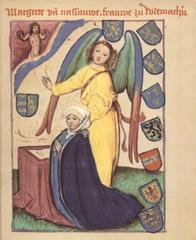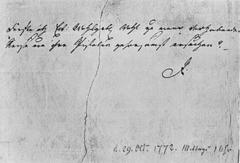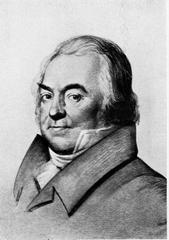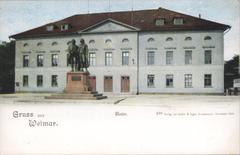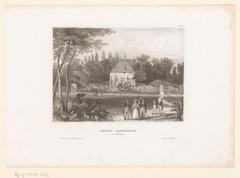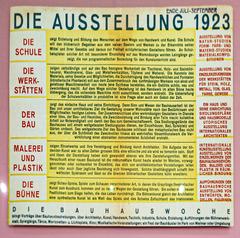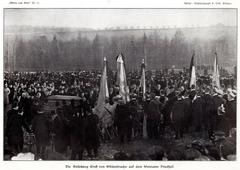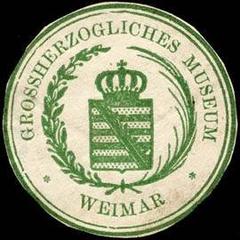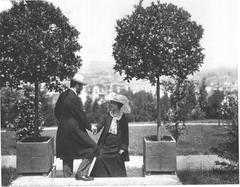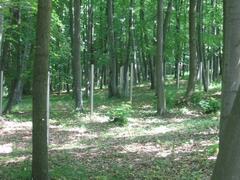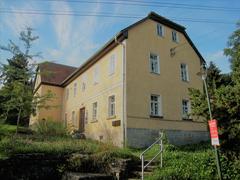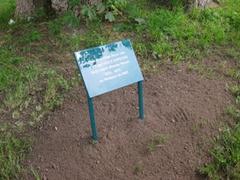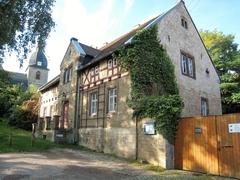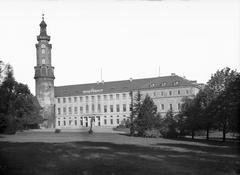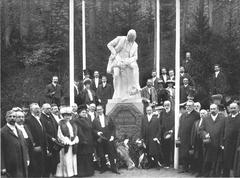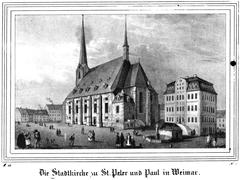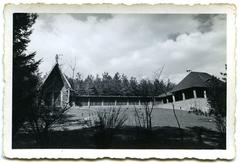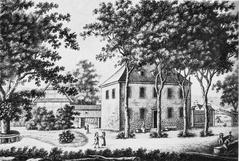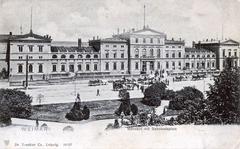Weimar University Library & Herzogin Anna Amalia Bibliothek: Visiting Hours, Tickets, and Historical Significance in Weimar, Germany
Date: 04/07/2025
Introduction
The Herzogin Anna Amalia Bibliothek—often referred to as the Weimar University Library—is a landmark of intellectual heritage and architectural splendor in the heart of Weimar, Germany. Celebrated for its opulent Rococo Hall and pivotal role in the development of Weimar Classicism, this library stands as a testament to centuries of literary and artistic achievement. Founded in 1691 and expanded under Duchess Anna Amalia in the late 18th century, the library now houses treasures such as the world’s largest Faust collection, extensive Goethe and Schiller manuscripts, and invaluable Bauhaus archives. After a devastating fire in 2004, meticulous restoration preserved both its beauty and its treasures, ensuring that future generations can experience its legacy.
For visitors, the library offers elegant historical interiors, curated exhibitions, and guided tours illuminating its rich history and cultural significance. Its central location near other major Weimar attractions like Goethe’s House and the Bauhaus Museum makes it an essential stop for anyone interested in German culture, art, and history. This comprehensive guide details everything you need to plan your visit, including opening hours, ticketing, accessibility, highlights, and nearby attractions.
For further details, consult these official and authoritative sources (Klassik Stiftung Weimar, awaymag.com, germanyfootsteps.com, Weimar University).
Table of Contents
- Introduction
- Historical Overview & Evolution
- Restoration and Preservation
- Architectural Features
- Cultural Significance
- Visitor Information
- Nearby Attractions & Getting There
- Bauhaus University Library: Distinction
- FAQs
- Conclusion & Call to Action
- References & Further Reading
Historical Overview & Evolution
The Herzogin Anna Amalia Bibliothek began as a ducal book collection in 1547 and became one of Germany’s most eminent libraries under Duchess Anna Amalia’s patronage in the late 18th century. The Duchess’s vision transformed the library into a center for Enlightenment ideals and Weimar Classicism, attracting literary giants like Goethe, Schiller, and Herder. The Rococo Hall, completed in 1766, quickly became an architectural masterpiece and the heart of Weimar’s intellectual scene (awaymag.com, germanyfootsteps.com).
Restoration and Preservation
On September 2, 2004, a fire ravaged the library, destroying 50,000 volumes and damaging the iconic Rococo Hall. Restoration efforts, completed in 2007, combined traditional craftsmanship with advanced conservation technology. Today, the library not only retains its historical character but also safeguards its collections with state-of-the-art fire protection and climate control systems (awaymag.com).
Architectural Features
The Rococo Hall
The Rococo Hall, with its oval, three-story chamber, intricate stucco, gilded bookcases, and sweeping galleries, is the centerpiece of the library. Natural light streams through tall windows, illuminating thousands of rare volumes and creating a sense of awe and serenity. The Hall is both a sanctuary for scholarship and a masterpiece of Enlightenment design (awaymag.com).
Ancillary Spaces
Surrounding reading rooms, salons, and exhibition areas are designed for quiet study and intellectual exchange, echoing the library’s Enlightenment roots. The library’s gardens and courtyards further enhance its tranquil atmosphere (germanyfootsteps.com).
Cultural Significance
Center of Weimar Classicism
The library was a core meeting place for the Weimar Circle, including Goethe and Schiller, whose works, manuscripts, and personal libraries enrich its collection. It played a vital role in shaping German literature, philosophy, and science (awaymag.com).
UNESCO World Heritage Site
In 1998, the Herzogin Anna Amalia Bibliothek was designated part of the Classical Weimar UNESCO World Heritage ensemble, honoring its universal cultural value (germanyfootsteps.com).
Contemporary Role
The library today hosts literary readings, academic conferences, temporary exhibitions, and digitization projects, making its treasures accessible worldwide and fostering a vibrant cultural dialogue (awaymag.com).
Visitor Information
Opening Hours & Tickets
-
Opening Hours:
Tuesday–Sunday: 10:00 AM – 5:00 PM
Closed on Mondays and public holidays. -
Tickets:
Adults: €8
Reduced (students, seniors): €5
Children under 12: Free
Family and group rates available.
Advance online booking is highly recommended, especially for the Rococo Hall (Klassik Stiftung Weimar).
Guided Tours
- Languages: German and English
- Duration: 45–60 minutes
- Booking: Required for most tours, especially during high season
- Content: In-depth exploration of the library’s history, architecture, and literary treasures
Accessibility
- Wheelchair access to most public areas, including the Rococo Hall
- Ramps, elevators, and accessible restrooms available
- Staff can provide personalized assistance—contact the library ahead of your visit
Visitor Tips
- Plan Ahead: Check current exhibitions and special events before your visit
- Peak Times: Book tickets well in advance during summer and festival periods
- Identification: Bring a valid photo ID if you plan to access special collections
- Etiquette: Maintain a quiet atmosphere, silence mobile devices, and follow staff instructions
Photography Policy
- Photography is generally restricted inside the Rococo Hall and collections to protect materials—ask staff for permissions before taking photos
Nearby Attractions & Getting There
The library is centrally located within Weimar’s UNESCO-listed district and is within walking distance of:
- Goethe’s House & Schiller’s House: Literary museums dedicated to Germany’s greatest writers
- Bauhaus Museum: Showcasing the modernist Bauhaus movement
- Park an der Ilm: A scenic park ideal for leisurely strolls
- Cranach House: The Renaissance residence of painter Lucas Cranach the Elder
Getting There:
Weimar is easily accessible by train and bus. The library is a short walk from the main train station. Parking is limited in the city center—public transport or walking is recommended.
Bauhaus University Library: Distinction
The Herzogin Anna Amalia Bibliothek is distinct from the Bauhaus University Library. While the former is a historical and cultural landmark, the Bauhaus University Library serves primarily academic and research functions, especially in architecture, arts, and design. Both are worth visiting for different reasons and together offer a comprehensive view of Weimar’s intellectual landscape (Weimar University).
FAQs
Q: What are the Herzogin Anna Amalia Bibliothek’s opening hours?
A: Tuesday to Sunday, 10:00 AM to 5:00 PM; closed on Mondays and public holidays.
Q: How can I buy tickets?
A: Tickets are available online or at the entrance. Advance booking is strongly recommended.
Q: Are guided tours available?
A: Yes, daily in German and English. Pre-booking is advised.
Q: Is the library accessible for visitors with disabilities?
A: Yes, with ramps, elevators, and accessible restrooms.
Q: Is photography allowed?
A: Generally restricted inside; seek staff permission.
Q: Are there discounts for students or groups?
A: Yes, reduced rates are available.
Conclusion & Call to Action
The Herzogin Anna Amalia Bibliothek is an essential destination for anyone interested in the intersection of art, literature, and history. Its blend of breathtaking Rococo architecture, storied collections, and ongoing cultural programming make it a highlight of any Weimar itinerary. Plan your visit in advance to ensure access to guided tours and exhibitions, and explore nearby sites for a full cultural experience.
For more information, tickets, and virtual tours, visit the official library website (Klassik Stiftung Weimar). Download the Audiala app for curated audio guides and the latest visitor updates.
References & Further Reading
- Klassik Stiftung Weimar – Herzogin Anna Amalia Bibliothek Visitor Information
- awaymag.com – Anna Amalia Library: Weimar Literary Treasures and Magnificent Architecture
- germanyfootsteps.com – Things to Do in Weimar
- Weimar University Official Website
- Travel Buddies – Weimar Private Tour
- Nomads Travel Guide – Weimar
